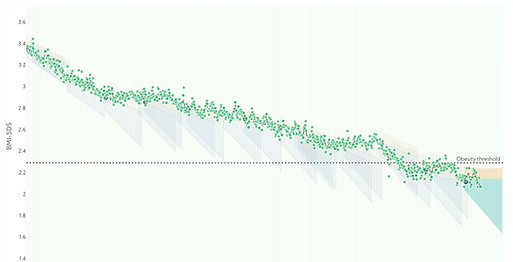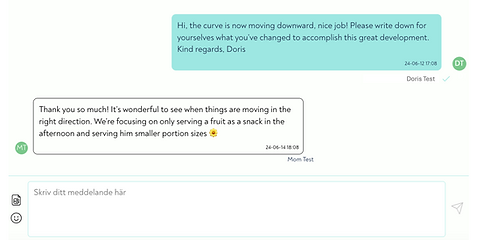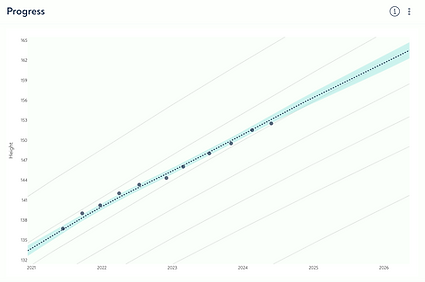

Evidence-based reduction of complications of excess weight in children and young people
Evira is an evidence-based digital tool designed to reduce obesity-related complications by decreasing the degree of obesity in children and young people within NHS trusts. It facilitates rapid communication between families and healthcare professionals. Clinical studies have shown it is twice as effective as traditional methods during the first year of treatment. Further research demonstrates long-term benefits, with positive outcomes maintained after three years of intervention.
A treatment tailored to you and your patients
User's words about Evira
Evira is an evidence-based method and digital tool for NHS trusts that reduces complications associated with excess weight by decreasing the degree of obesity in children and young people. It enables individualised care and close family contact while requiring fewer resources.
THE EVIRA METHOD
An effective way to treat paediatric obesity.
Evira's approach is based on individually set goals and aims to build independence and confidence in both the patient and their family.
EVIRA AT HOME
For immediate feedback and clearer treatment goals.

Daily measurements are collected at home using a measuring device that does not display numbers.
The app visualises relative weight development for easy understanding and rapid feedback.
EVIRA AT THE CLINIC
Motivation and intervention at crucial moments.

Multi-disciplinary teams have access to the entire treatment history and employ the treatment method through a clinical web portal.
The Evira method
The Evira Method is designed to provide families with the support they need to succeed with their goals. The family-centred approach creates a care experience that is both engaging and goal-oriented. It is based on targeted objectives and aims to build the patient's and family's independence and self-confidence.
Empowerment
We encourage families to be active participants in their own care. By allowing them to choose their own lifestyle changes and fostering self-reflection, they can achieve lasting results on their own terms.
Proactive treatment
Acting quickly when a postive trend is broken is crucial. With the help of Evira, healthcare professionals can promptly intervene. This proactive approach helps families restore positive development and prevent negative trends.
Goal-oriented
The Evira Method uses graphical goals to keep families engaged and informed on their progress. This visual representation of goal achievement helps them understand and reach their treatment goals.
Continuous support
A strong alliance between the family and healthcare professionals is central. Evira enables caregivers to continuously offer support to families. By empathically following up on both positive and negative trends, a strong and sustainable care relationship is created.
Smooth and simple
Evira's follow-up requires just 2-4 minutes per week per active patient between visits, with treatment personalised to each family's current needs. Regular contact helps build a strong alliance with patients and their families.
By collecting objective data, you can monitor your patients' progress between visits, identifying those who need extra support when they need it most.
High-resolution measurement reports
We encourage patients to collect daily measurement data using our automatic measurement device. This allows you to access all the data patients collect, enabling you to monitor trends over time.


Monitor your patients' progress
Gain a comprehensive overview of how your patients are doing. Use search, filter, and sort functions to identify those needing extra support. Evira helps you pinpoint which patients require assistance and understand their specific needs.
Maintain contact with your patients between visits
Families can ask questions anytime through the app. Respond at your convenience to strengthen relationships through continuous communication.
Messages can be translated into all languages using artificial intelligence to facilitate communication.


Invididualised height growth per patient
Children with obesity exhibit different growth patterns compared to those of normal weight. We match each weight measurement with an individualised height estimate. We utilise artificial intelligence to accurately predict height growth several months in advance.
Cost-effective care
With Evira, the need for clinic visits is reduced, and more efficient, frequent communication between healthcare providers and patients decrease cancelled appointments. This lessens the strain on healthcare and frees up resources.
A lower cost per patient enables more patients to be effectively cared for without increasing total costs. This economic efficiency allows healthcare resources to be better allocated where they are most needed, improving availability and quality of care.
Evira's digital treatment enables healthcare providers to stay in touch with patients who live far from the clinic, spreading out clinic visits and reducing the need for long, inconvenient trips. This is especially important in sparsely populated areas where distance can be a significant barrier to accessing care.
Taken together, these changes lead to a more flexible, accessible and cost-effective care model that better meets the needs of today's patients and healthcare providers.
"With Evira, we spend an average of about 1.8 minutes per patient per week on digital contact, plus a 60-minute visit every three months. For our 50 active patients this amounts to approximately 5.7 hours per week in total.
Before Evira, providing similar support required a 60-minute visit with each patient every month, totaling about 12.5 hours per week for 50 patients. It was not at all the same support as today with Evira, but back then it felt like good follow-ups."
– TioHundra, an integrated healthcare provider in Norrtälje, Sweden (2024)
The most valuable tool for healthcare professionals
Evira has been used in practice for several years. See below to find out what healthcare professionals are saying about the tool.
"As a nurse working with families affected by the complications of obesity, I am committed to supporting them to make positive changes to improve their health and lifestyle.
We have been working with Evira for a few months, and the software is easy to use. Following the training our team have keenly supported an increasing number of families commence the treatment. The Evira team is readily available to answer any queries and help us to develop an effective working model for our families.
Having access to live progress allows us to intervene in real time, reaching out to reflect on progress and overcome challenges.
The time between clinic appointments can be lengthy and families are often reluctant to reach out in between appointments when they are struggling, or things aren't going the way they want. Evira helps us monitor this and make contact, reducing the dread of the next appointment.
Motivation of the teenage group can be difficult, but having Evira gives us a visual tool to link behaviours to results. "
- Jayne, Complications of Excess Weight Clinical Nurse Specialist, UK
More voices from clinic staff
Locations where Evira is used today
The maps below show the pediatric clinics that today use Evira to treat childhood obesity. Evira is used at specialist clinics in the United Kingdom that treat complications from obesity (CEW – Complications from Excess Weight) as well as in pediatric clinics and child and adolescent health centers in Sweden, and in clinical research across several European countries.
Contact an Evira clinic near you to learn more about what it means to use Evira in the treatment of overweight and obesity.
The UK (CEW)
Want to read more about CEW? Go to NHS England.
Evira has been used in clinical practice since 2018
Every day, patients and clinical staff use Evira to reduce complications associated with excess weight by decreasing the degree of obesity in children and young people.

4500 +
Patients
Thousands of patients have received, or are receiving, support to manage complications related to excess weight with Evira

1,5 years
Average duration of treatment

1 000 000+
Measurements
One million measurements have been carried out in the safety of the patients' own homes

−0,3
BMI-SDS*

7 000+
Years of treatment
Patients have already contributed thousands of treatment years, which we regularly analyse to enhance the tool and the treatment

50
Clinics
This indicates the median and average duration of treatment with Evira, which varies based on factors such as the initial degree of obesity
This shows the average reduction in BMI-SDS (a measure of relative degree of overweight) for a patient after one year of treatment with Evira
This shows how many clinics have used Evira for the treatment of childhood obesity in five different countries
* WHO BMI SDS



